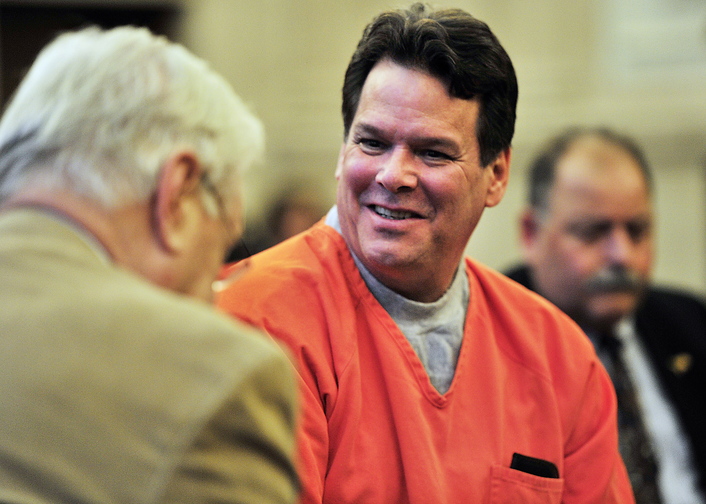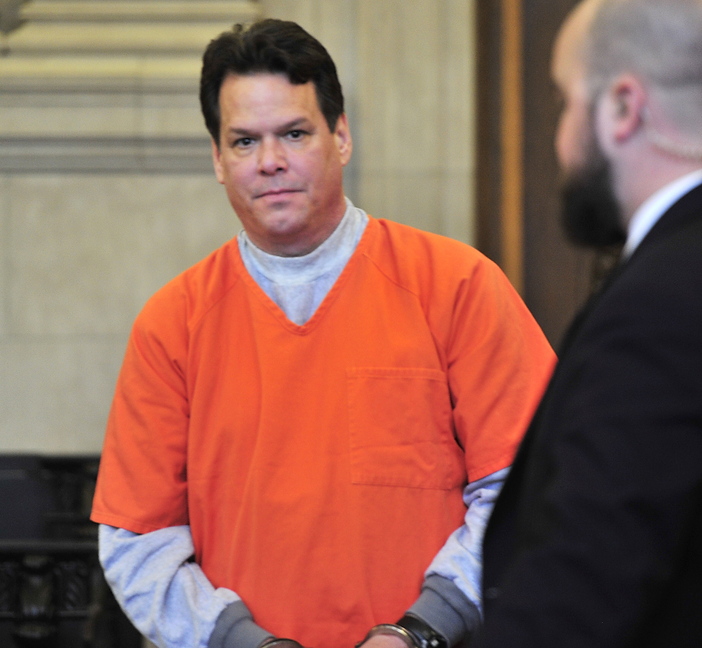PORTLAND — Yet another chapter in the most litigated criminal case in Maine history opened Thursday when Dennis Dechaine appeared in court to continue his 25-year quest for exoneration in the killing of a young girl.
Dechaine, 55, was convicted in 1989 of murdering 12-year-old Sarah Cherry of Bowdoin, who was kidnapped, sexually assaulted, stabbed and strangled. Her body was left in the woods of Bowdoin.
Dechaine is serving a life sentence in the Maine State Prison but has maintained his innocence from the start. Over the years, he has drawn supporters, including Trial and Error, a group made up largely of his friends and family members, and the Innocence Project, a national group that specializes in using DNA to exonerate wrongfully convicted inmates.
His latest appeal for a new trial centers on new DNA analysis that suggests someone else might have killed Sarah Cherry. But that analysis doesn’t rule out Dechaine; it concludes only that DNA from more than one person was on the girl’s shirt and scarf.
After an unexpected five-hour delay, Thursday’s hearing to determine whether Dechaine will get a new trial became a dense technical discussion about DNA analysis, breaking little new ground.
Expert testimony will resume Friday morning. Justice Carl Bradford — who presided over the trial in 1989 — will then ask Dechaine’s attorney, Steven Peterson of Rockport, and Deputy Attorney General William Stokes to submit written briefs. Bradford’s decision could still be months away.
Speaking outside Cumberland County Unified Court after the hearing, Peterson agreed that testimony from William Moore, a private investigator hired by Dechaine’s supporters, and Rick Staub, a Texas-based forensic investigator and DNA expert, was inconclusive.
“The burden of proof is on us to convince the judge,” he said. “But I knew there would be conflict. This is the very kind of thing a jury could consider reasonable doubt.”
Thursday’s hearing was supposed to begin at 9 a.m. but Dechaine had not arrived in court by that time. He didn’t leave the prison in Warren until nearly 11 a.m., which pushed the hearing to 2 p.m. Stokes called the delay a paperwork error.
People in the courtroom for the hearing included supporters and family members of Dechaine, and others connected to Sarah Cherry
All eyes were on Dechaine when he finally walked through the courtroom doors and took his seat next to Peterson. Some observers watched him for several minutes, but he looked at no one.
During testimony, he listened intently with his hands clasped in his lap and his thumbs moving constantly.
Testimony from Moore, the private investigator, dealt with the possibility that another man, Douglas Senecal, killed the girl. Senecal, who now lives in Florida, has been named as a possible suspect in court documents in the past. Moore investigated Senecal a few years ago in Florida, and even surreptitiously obtained a DNA sample from him. That sample did not match DNA found under the girl’s clipped fingernails.
Still, as Staub testified, new DNA obtained from the girl’s clothes came from more than one person.
At the time he was charged with the murder, Dechaine was a 30-year-old organic farmer who lived in Bowdoinham, the town next to Bowdoin in Sagadahoc County.
The victim was kidnapped while she was babysitting on July 6, 1988. She was tied up, sexually assaulted with a stick, stabbed multiple times and strangled with a scarf. Her body was found in the woods two days later.
Dechaine emerged as a suspect early in the investigation. A notebook and a truck repair bill with his name on them were found in the driveway of the home where the girl was kidnapped.
Dechaine’s truck was found nearby, and he was seen walking out of the woods. The scarf and the rope that were used to tie the girl had come from Dechaine’s truck.
DNA evidence was not widely used or reliable at the time, so his conviction by a jury was based largely on circumstantial evidence.
Peterson, who has represented Dechaine in his appeals process for the last nine years, has contended that if DNA evidence were presented to a jury and if he were allowed to introduce alternative suspects, the outcome would be different.
But a law passed in 2006 requires defendants to prove that any new DNA evidence comes from the perpetrator of the crime. That evidence must be strong enough to outweigh other evidence.
Stokes has maintained that any new DNA evidence is unlikely to change anything about the case.
Eric Russell can be contacted at 791-6344 or at:erussell@pressherald.comTwitter: @PPHEricRussell
Send questions/comments to the editors.



